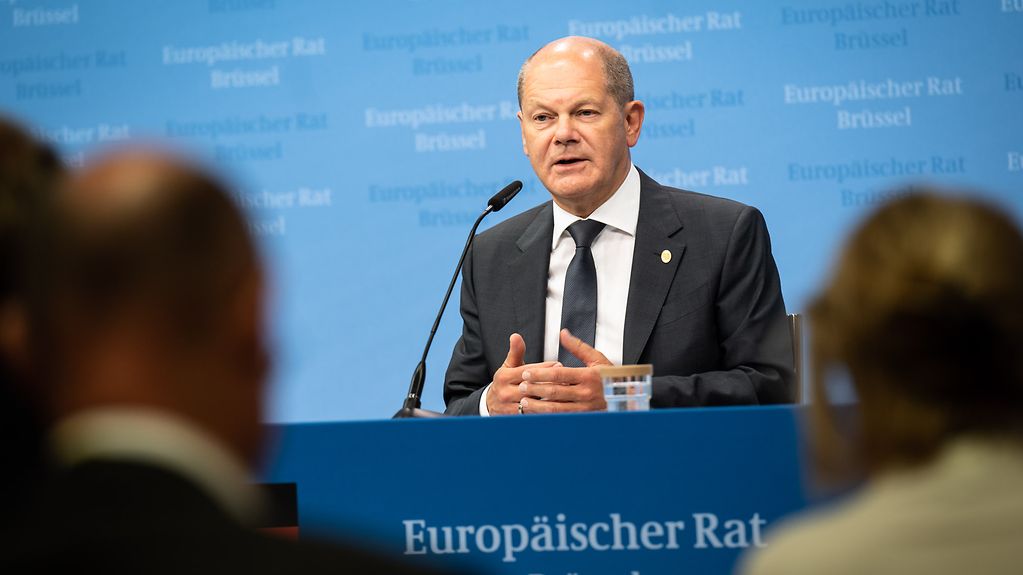European Council meeting in Brussels
Federal Chancellor Olaf Scholz summed up the EU Western Balkans Summit and the meeting of the European Council in positive terms. “Speaking with 27 voices in unison, the member states represented here have said that they want to support Ukraine along its European journey. Ukraine and Moldova have both been granted accession candidate status,” said Federal Chancellor Scholz at the closing press conference.

Federal Chancellor Scholz pledged Germany’s wholehearted support to the EU accession candidates.
Photo: Federal Government /Steins
Candidate status for Ukraine and Moldova
On the first day of the summit, the EU heads of state and government voted unanimously in favour of accession candidate status for Ukraine and the Republic of Moldova. In the Federal Chancellor’s view, this was a major step forward, prompting him to describe the summit as “historic.” The Federal Chancellor also noted that the summit had put the necessary framework in place.
Georgia is also to be awarded candidate status, but must first fulfil some additional criteria.
Accession prospects for the Western Balkans
The heads of state and government of the six partner countries of Albania, Bosnia and Herzegovina, Serbia, Montenegro, North Macedonia and Kosovo met their European counterparts for discussions at the EU Western Balkans Conference on Thursday. At the subsequent meeting of the European Council, the heads of state and government wholeheartedly reaffirmed their commitment to offering prospects of EU membership for Western Balkan states. They called for the accession process to be accelerated.
The Federal Chancellor stressed that all six countries could count on Germany's support. “It is important that we take advantage of the new impetus to re-energise efforts to ensure these countries really do have a realistic chance of becoming members of the European Union. Some have already gone to great lengths and put huge efforts into their preparations,” said the Federal Chancellor at the end of the summit.
“Without reforms this won’t be possible”
The Federal Chancellor also warned that the European Union must undertake its own reforms in readiness for its expansion, citing the example of majority voting. “Without reforms this won’t be possible”, said the Federal Chancellor, adding that the main thing now was to take action.
How can a country become a member of the European Union? What conditions must it meet to do so? Questions and answers can be found here.
Impact of the war in Ukraine
The European Council also discussed the latest developments in connection with Russia’s war against Ukraine. The European Union will continue to provide crucial support for the Ukraine’s general economic, social and financial resilience, including the supply of humanitarian aid.
“We also discussed and agreed on highly targeted sanctions.” The Federal Chancellor pledged that the EU would make these even tougher if required. “We continue to stand side by side with Ukraine in solidarity as it defends itself against a dreadful war of aggression.”
Also on the agenda: energy security, Croatia’s accession and “Wider Europe”
The leaders also discussed a range of economic issues including energy security. The Federal Chancellor expressed his confidence that the EU was making good progress towards better coordination of energy policy. Scholz described how the EU was developing plans “so that we can improve our prospects for independence from Russian fossil fuel imports. At the same time, we are accelerating the development of our community in such a way that we can focus on expanding alternative production capacities for renewables in particular.”
The talks also addressed plans for Croatia to join the Eurozone on 01 January 2023. The Federal Chancellor characterised this as a “positive development.” He said he saw it as a “sign that the euro also binds us together and that this is something that, for many countries, is worth striving for.” Final agreement on this is set to take place when the finance ministers meet for the Economic and Financial Affairs Council in July.
Under the agenda item of “Wider Europe”, the heads of state and government exchanged views on the EU’s future relationships with its partners, which included a proposal to establish a European political community.
Conference on the Future of Europe
The Conference on the Future of Europe was also on the agenda. The heads of state and government agreed that the conference represented a unique opportunity to listen to the citizens of Europe. The Council noted that other EU bodies were already working to implement the outcomes. The heads of state and government stressed the importance of informing citizens about next steps and accomplishments to date.
Conference on the Future of Europe: what is it exactly?
The key focus of the Conference on the Future of Europe is the citizens of the whole of Europe. Discussions lasted a whole year on issues of Europe’s future, from the coronavirus pandemic and climate change through to digitalisation and social justice. The Conference generated 49 proposals and over 300 measures. EU institutions are now discussing how to implement them. See here for details.